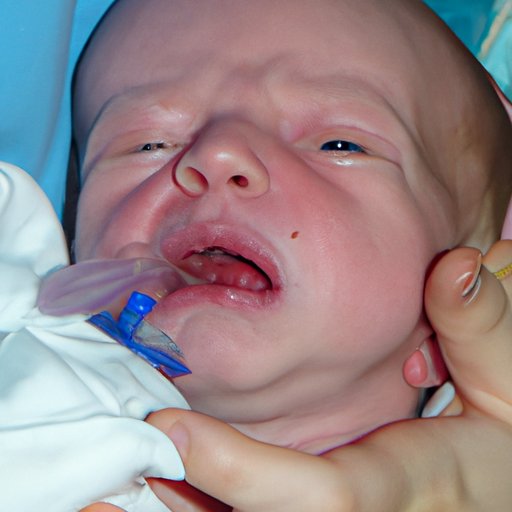
I. Introduction
Newborn gas is a common issue that most parents will encounter at some point. It occurs when your baby swallows air during feeding or crying, creating discomfort and a bloated feeling. Fortunately, there are many strategies you can use to help your baby alleviate this problem. In this article, we will explore some tips for burping, natural remedies, formula options, medical interventions, and more to help relieve your baby’s gas and bloating.
II. Tips for Burping Baby
Burping is one of the easiest and most effective ways to help your baby relieve gas. It is especially important after feeding, and it is recommended to burp your baby every 2-3 oz or after 5-10 minutes of feeding. Here are some tips for burping:
- Burping Positions: You can burp your baby over your shoulder, on your lap, or while sitting them up. Experiment to find what works best for you and your baby.
- Patting Techniques: Use gentle but firm pats on your baby’s back, rubbing back, or gentle bounces can also help to burp your baby.
- Breastfeeding vs. Bottle-Feeding: Breastfeeding babies may not need to be burped as often as bottle-fed babies, but it’s still important to try. If your baby is bottle-fed, it is highly likely that they have swallowed air and need to burp.
III. Home Remedies
There are plenty of natural remedies to alleviate gas and other digestive issues in newborns. However, it’s essential to follow safe and recommended procedures. Here are some remedies to try at home:
- Massage: Gently massage your baby’s tummy in a clockwise direction, using your fingertips. This can help to ease discomfort and move gas along.
- Bicycle Legs: Lay your baby on their back and move their legs in a bicycling motion. This can help to move trapped gas through the intestines.
- Warm Bath: A warm bath can help to soothe your baby and relax their muscles, which can facilitate gas expulsion.
- Probiotics: Probiotics are live cultures of good bacteria that can help to maintain a healthy gut flora and alleviate gas symptoms. If you are breastfeeding, you can consume probiotic-rich foods. If your baby is bottle-fed, consult your pediatrician before giving them any probiotics.
IV. Formula Options
If your baby is formula-fed and is experiencing gas problems, it may be worth considering different formula options. Here are some tips to help you pick the right formula for your baby:
- Hypoallergenic Formula: Some babies are sensitive to cow’s milk or soy, which can cause gas and other digestion issues. Hypoallergenic formula is specially designed for sensitive babies.
- Prebiotic-Enriched Formula: Prebiotic-enriched formulas contain compounds that nourish the gut flora and support good digestion. They can also reduce the amount of gas produced during digestion.
- Slow-Flow Nipples: If your baby is bottle-fed, try using a nipple with a smaller hole to reduce the amount of air they swallow during feeding. This can help to prevent gas from forming in their stomach.
V. Medical Interventions
In most cases, newborn gas is a normal part of the postnatal period. However, if your baby experiences severe gas, prolonged distress, or other symptoms such as vomiting, diarrhea, or blood in their stool, it may be time to seek medical advice. Here are some potential medical interventions:
- Simethicone Drops: Simethicone is a medication that breaks down gas bubbles in the stomach, making them easier to pass. It is available in liquid form and can be given to babies as directed by a pediatrician.
- Prescription Medications: Some babies may need prescription medications to help with gas or underlying medical issues. These may include acid reflux medications or specialized formulas.
- Diagnostic Tests: If your baby’s gas persists, your pediatrician may recommend diagnostic tests like an upper GI series or stool sample analysis to identify any underlying problems.
VI. Conclusion
Newborn gas can be distressing for both babies and parents, but there are many solutions to alleviate it. Burping, natural remedies, formula options, and medical interventions can all help to ease your baby’s discomfort. Remember, if your baby’s gas problems don’t improve or get worse, it’s always a good idea to seek medical advice. In most cases, your baby will outgrow their gas issues by the time they are 3-6 months old, but until then, these tips can help you and your little one get through this challenging time.
Additional Note: Always talk to your pediatrician before giving your baby any medication or supplement and follow proper procedure.




